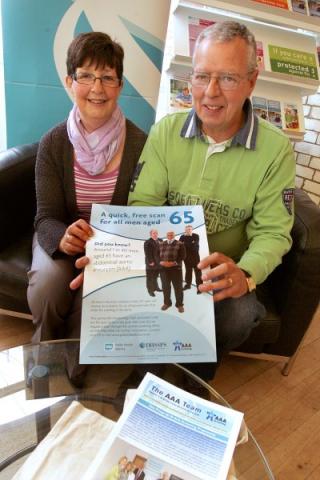The PHA is reminding everyone that AAA screening can save lives!

To celebrate the first anniversary of the full roll-out of the Northern Ireland AAA Screening Programme, the Public Health Agency (PHA) is urging all men aged 65 to take up the offer of having this vital health check.
The aorta is the main artery that supplies blood to your body. It runs from your heart down through your chest and abdomen (belly).
As some people get older, the wall of the aorta in the abdomen can become weak and balloon out to form an aneurysm, rather like a bulge in a worn tyre. This is called an abdominal aortic aneurysm (AAA).
Each year around 80–100 people in Northern Ireland die from a ruptured abdominal aortic aneurysm (AAA). Most people will be unaware that they have an aneurysm as they rarely have symptoms, but an aneurysm is often life threatening if it ruptures.
Research shows that men are six times more likely to have this type of aneurysm than women and the chance of having an aneurysm increases with age. The good news is that if an aneurysm is detected early, it can be monitored and, if necessary, treated. Research shows that screening men aged 65, using an ultrasound scan, will reduce the death rate from ruptured AAAs by around 50%.
Dr Adrian Mairs, Consultant in Public Health Medicine at the PHA and public health lead for the Northern Ireland AAA Screening Programme, said: “Approximately one in every 40 men will have an abdominal aortic aneurysm. With this in mind, the Department of Health and the Public Health Agency (PHA) introduced the Northern Ireland AAA Screening Programme in June 2012, to reduce AAA-related mortality by providing a screening programme for men in the year they turn 65 and, on request, for men over 65. The programme was fully rolled out across Northern Ireland in July 2012 and is now provided at 18 different screening locations.”
Sharing experiences
David McIntyre is a fit and healthy 65 year-old retired postman from Lurgan. David had an aneurysm detected after attending for screening and is calling for other men to seriously consider their invite also.
David explains: “At the start of February 2012 I received a letter from the Northern Ireland AAA Screening Programme inviting me to attend a screening appointment on 11 February at Lurgan Hospital.”
David was unsure whether to attend for screening or not: “I was in two minds whether to go to this screening but was persuaded by my wife Helen to get the scan done, saying ‘What harm could it do?’ so I went along on the Monday morning. I was shown into the scanning room where the two friendly screening technicians explained the procedure to me. The test was simple and pain-free. Some gel was applied to my abdomen and the ultrasound scanner was moved across my abdomen. The screening technician explained what she was doing and checked with me to make sure I was OK at all times.”
The scan detected that David had a small to medium aneurysm. As most AAAs grow very slowly, men with a small or medium AAA may never develop a large AAA but will be monitored accordingly to see if it grows. David continued: “Immediately after the scan I was told by the technician that I had a small to medium aortic aneurysm. She gave me some information leaflets and said at this stage I only needed to be monitored. They also notified my GP with the results of the scan. I was reassured that at least now I know about the aneurysm and that it will be monitored to help prevent it becoming fatal.
“My advice to other men who are invited to have a scan and are not sure if they should go would be go along, have it checked out. It is painless and it is the only way you will know for sure what the condition of your abdominal aorta is… HAVING THIS SCAN COULD SAVE YOUR LIFE!”
PHA advice
Dr Mairs continued; “It is extremely encouraging to see that, since the introduction of the screening programme, 82 per cent of men invited have attended (over 7,500 men) and 111 AAAs have been detected”
The risk of having an abdominal aortic aneurysm is increased if:
• You smoke
• You have high blood pressure
• Your brother, sister or parent has, or had, an AAA.
“I encourage all men who receive an appointment for AAA screening to seriously consider taking up the offer of this quick and painless health check." Dr Mairs concluded.
Those eligible for screening will receive an invitation leaflet in the post at the home address provided by their GP. It is therefore important that your GP has your most up-to-date address and correct date of birth or you may miss the chance to take part in the programme.
